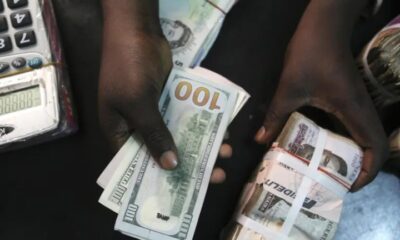Economy
Price of beans rose by 271.55% in August — NBS

The National Bureau of Statistics has reported a rise in the price of brown beans (sold loose) in August 2024.
According to the Selected Food Price Watch for August, the average price of 1kg of brown beans surged by 271.55 per cent on a year-on-year basis to N2,574.63, up from N692.95 in August 2023.
On a month-on-month basis, the price of brown beans also recorded a 5.31 per cent increase, rising from N2,444.81 in July 2024.
“Selected Food Price Watch for August 2024 shows that the average price of 1kg beans brown (sold loose) stood at N2,574.63.
“This indicates a rise of 271.55 per cent in price on a year-on-year basis from N692.95 recorded in August 2023 and a 5.31 per cent rise in price on a month-on-month basis from N2,444.81 in July 2024,” NBS said.
Other food items also experienced significant price increases during the same period. The price of agric eggs (medium size, 12 pieces) jumped by 121.92 per cent from N1,031.55 in August 2023 to N2,289.19 in August 2024. On a month-on-month basis, the price of eggs increased by 5.48 per cent from N2,170.17 in July 2024.
Similarly, the price of sliced bread recorded a year-on-year rise of 113.16 per cent, moving from N684.85 in August 2023 to N1,459.85 in August 2024. On a month-on-month basis, sliced bread saw a 2.28 per cent price increase from N1,427.25 in July 2024.
In contrast, the price of 1kg of tomatoes dropped by 11.07 per cent month-on-month, falling from N1,693.83 in July 2024 to N1,506.35 in August 2024.
The report also showed that the price of 1kg of local rice (sold loose) rose by 148.41 per cent on a year-on-year basis, climbing from N737.11 in August 2023 to N1,831.05 in August 2024. On a month-on-month basis, the price increased by 3.65 per cent.
However, the price of yam tubers (1kg) saw a slight decrease on a month-on-month basis, dropping by 7.82 per cent from N1,802.84 in July 2024 to N1,661.80 in August 2024. Nevertheless, the year-on-year price of yam tubers still showed a significant rise of 188.31 per cent from N576.39 in August 2023.
“Also, the average price of 1kg of Yam tuber increased by 188.31 per cent on a year-on-year basis from N576.39 in August 2023 to N1,661.80 in July 2024. On a month-on-month basis, it decreased by -7.82 per cent from N1,802.84 in July 2024,” the report added.
In July, PUNCH reported that prices of Beans, Tomatoes, Irish potatoes, Garri, Yam and other food items witnessed significant price increases in June 2024.
Economy
More Nigerians to experience poverty by 2027 – World Bank

The World Bank’s latest Africa’s Pulse report has projects a grim future for Nigeria, with poverty expected to rise by 3.6 percentage points by 2027.
Released during the IMF and World Bank Spring Meetings in Washington, DC, the report cites Nigeria’s reliance on oil, economic fragility, and governance challenges as key drivers.
It highlights the country’s structural economic weaknesses, dependence on oil revenues, and national fragility as key barriers to meaningful poverty reduction.
“Poverty in resource-rich, fragile countries, including large economies like Nigeria and the Democratic Republic of Congo, is projected to increase by 3.6 percentage points between 2022 and 2027,” the report stated.
Despite recent growth in Nigeria’s non-oil sector during the last quarter of 2024, the World Bank warns that this progress is unlikely to translate into widespread poverty alleviation due to ongoing fiscal and institutional challenges.
The report emphasizes that Sub-Saharan Africa remains the world’s poorest region, with an overwhelming 80% of the globe’s 695 million extreme poor residing there in 2024.
Within the region, half of the 560 million extremely poor people were located in just four countries, including Nigeria.
In stark contrast, South Asia accounted for 8% of the world’s extremely poor population, East Asia and the Pacific 2%, the Middle East and North Africa 5%, and Latin America and the Caribbean 3%.
The World Bank attributes the rising poverty in Nigeria and similar economies to weakening oil prices and fragile governance structures, noting: “This follows a well-established pattern whereby resource wealth combined with fragility or conflict is associated with the highest poverty rates, averaging 46% in 2024, which is 13 percentage points higher than in non-fragile, resource-rich countries.”
Meanwhile, non-resource-rich countries in Africa are experiencing stronger economic growth and faster poverty reduction, buoyed by high agricultural commodity prices and more resilient fiscal policies.
To reverse Nigeria’s downward poverty trend, the World Bank recommends reforms that prioritize inclusive economic growth and stronger public financial management.
It calls on the government to focus on “improving fiscal management and building a stronger fiscal contract with citizens to promote inclusive economic development and long-term poverty alleviation.”
Economy
SEE current exchange rate of the Dollar to Naira

What Is the Dollar to Naira Exchange Rate at the Black Market (Aboki FX)?
Here is the Dollar to Naira exchange rate at the parallel market, popularly known as the black market (Aboki fx), for Tuesday, April 23, 2025.
You can exchange your dollars for naira at the following rates:
Black Market Exchange Rate (Lagos – April 23, 2025):
According to sources at the Bureau De Change (BDC), the exchange rate at the Lagos parallel market saw traders buying at ₦1610 and selling at ₦1620 per US dollar.
It’s important to note that the Central Bank of Nigeria (CBN) does not recognize the black market. The CBN advises individuals seeking foreign exchange transactions to do so through their banks.
Dollar to Naira Exchange Rates
Market Type Buying Rate Selling Rate
Black Market ₦1610 ₦1620
CBN Official Rate ₦1591 (Low) ₦1606 (High)
Note: Forex rates vary across dealers and regions, and actual rates may differ from those listed.
Meanwhile, the Nigeria Customs Service (NCS) has announced the seizure of 298 smuggled items worth ₦7.6 billion between January and March 2025. The NCS also disclosed that it generated a total revenue of ₦1.75 trillion in the first quarter of the year.
Economy
Volvo announces termination of 800 U.S. workers, cites tariff, market decline

Volvo Group has announced plans to lay off up to 800 workers at three of its U.S. facilities over the next three months, citing ongoing market uncertainty and declining demand exacerbated by tariffs introduced under the administration of President Donald Trump.
The affected locations include the Mack Trucks plant in Macungie, Pennsylvania, as well as Volvo Group sites in Dublin, Virginia, and Hagerstown, Maryland.
In a statement on Friday, Volvo Group North America confirmed that between 550 and 800 employees would be impacted.
The company, a subsidiary of Sweden’s AB Volvo, employs nearly 20,000 people across North America.
The layoffs come amid wider turmoil in the automotive and manufacturing sectors, as shifting U.S. trade policy and a series of tariffs continue to drive up production costs. Economists have pointed to the uncertainty surrounding Trump’s trade strategy as a factor undermining both business and consumer confidence, with concerns mounting over a potential economic slowdown or recession.
According to Volvo, the company is grappling with a decline in heavy-duty truck orders, driven by instability in freight rates, anticipated regulatory changes, and the growing financial burden of tariffs. “We regret having to take this action, but we need to align production with reduced demand for our vehicles,” a company spokesperson stated in an email quoted by Reuters.
Volvo’s announcement marks another blow to an industry already navigating a complex web of supply chain challenges and fluctuating market conditions, with other manufacturers also warning of potential cost hikes and disruptions tied to global trade disputes.
-

 Economy16 hours ago
Economy16 hours agoSEE current exchange rate of the Dollar to Naira
-

 News20 hours ago
News20 hours agoJust in: PDP can never die over gale of defection -Hon Teejay Yusuf insists
-

 News13 hours ago
News13 hours agoJUST IN: Rivers Sole Administrator Ibas Shun Reps Panel
-

 Opinion22 hours ago
Opinion22 hours agoCBN under Cardoso and $6.83 Billion balance of payments surplus in 2024 that signals economic resurgence
-

 News24 hours ago
News24 hours agoUS indicts Nigerian for $690k scam, false citizenship claim
-

 Metro24 hours ago
Metro24 hours agoTwo killed, 20 farms destroyed in fresh Plateau attack
-

 News24 hours ago
News24 hours agoCourt orders 54 banks to return N9.3bn stolen by hackers
-

 News16 hours ago
News16 hours agoFCT Flags Off One-Week Free Holiday Vocational and Entrepreneurship Training





